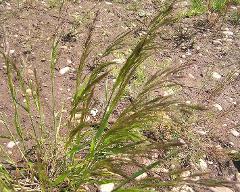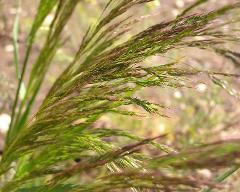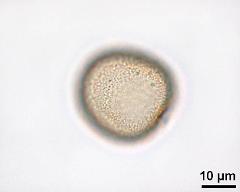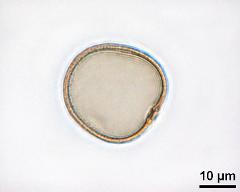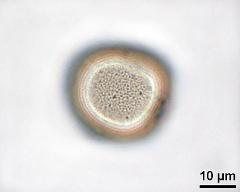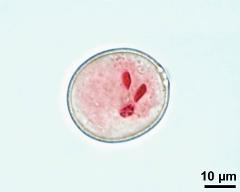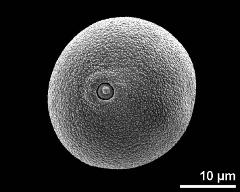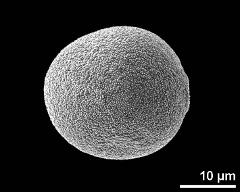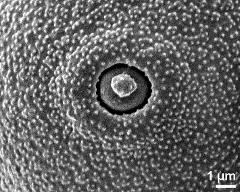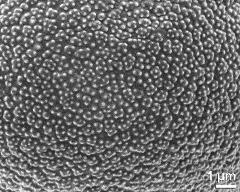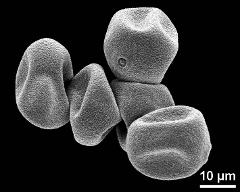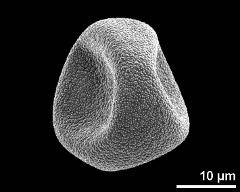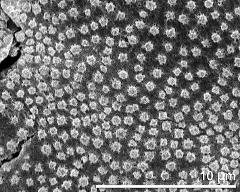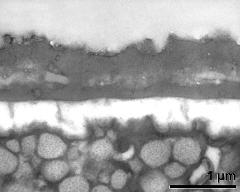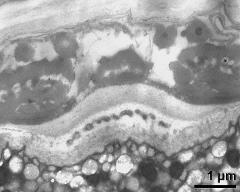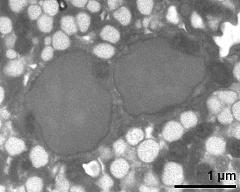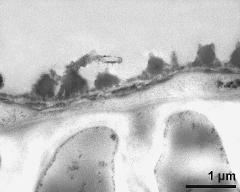Apera spica-venti
Taxonomy: Spermatophyta, Poales, Poaceae, Apera
Published: 2005-06-01
Pollen Description
Shape, Size and Aperture
pollen unit: monad, dispersal unit and peculiarities: monad, size (pollen unit): medium-sized (26-50 µm), size of hydrated pollen (LM): -, shortest polar axis in equatorial view (LM): -, longest polar axis in equatorial view (LM): -, shortest diameter in equatorial or polar view (LM): -, longest diameter in equatorial or polar view (LM): -, pollen class: -, polarity: heteropolar, P/E-ratio: -, shape: spheroidal, outline in polar view: circular, dominant orientation (LM): -, P/E-ratio (dry pollen): -, shape (dry pollen): irregular, outline in polar view (dry pollen): irregular, infoldings (dry pollen): irregularly infolded, aperture number: 1, aperture type: -, aperture condition: ulcerate, aperture peculiarities: annulus, operculum
Ornamentation and Structure
LM ornamentation LM: psilate, nexine: -, sexine: -, SEM ornamentation SEM: granulate, verrucate, suprasculpture SEM: -, TEM tectum: eutectate, infratectum: columellate, foot layer: continuous, endexine: absent, intine: monolayered, wall peculiarities: -, supratectal element: -
Miscellaneous
pollen coatings: absent, reserves in cytoplasm: polysaccharide vesicles, starch, cell number: 3-celled, Ubisch bodies: present
Annotations: shape hydrated tends to prolate.
Author(s) of diagnosis: Sam, S.
Pictures
Picture legend
- habitus of Apera spica-venti, photographer: Sam, S.
- flowers of Apera spica-venti, photographer: Sam, S.
- upper focus - fresh, acetolyzed, unstained, photographer: Sam, S.
- optical section - fresh, acetolyzed, unstained, photographer: Sam, S.
- lower focus - fresh, acetolyzed, unstained, photographer: Sam, S.
- vegetative nucleus and sperm cells - fresh, unfixed, aceto-carmine, photographer: Sam, S.
- polar view - fresh, DMP & critical point dried, photographer: Sam, S.
- equatorial view - fresh, DMP & critical point dried, photographer: Sam, S.
- aperture - fresh, DMP & critical point dried, photographer: Sam, S.
- exine surface - fresh, DMP & critical point dried, photographer: Sam, S.
- dry pollen grains - dry, sputter coated with gold, photographer: Sam, S.
- dry pollen grain - dry, sputter coated with gold, photographer: Sam, S.
- anther wall with Ubisch bodies - fresh, DMP & critical point dried, photographer: Sam, S.
- interapertural area of pollen wall - fresh, glutaraldehyde & osmium & potassium ferrocyanide, modified Thiéry-test, photographer: Sam, S.
- apertural area of pollen wall and Ubisch bodies - fresh, glutaraldehyde & osmium & potassium ferrocyanide, modified Thiéry-test, photographer: Sam, S.
- two sperm cells - fresh, glutaraldehyde & osmium & potassium ferrocyanide, modified Thiéry-test, photographer: Sam, S.
- Ubisch bodies on inner anther wall - fresh, glutaraldehyde & osmium & potassium ferrocyanide, modified Thiéry-test, photographer: Sam, S.
Literature
Copyright and Citation
Cite this publication as:
Sam S. 2005. Apera spica-venti. In: PalDat - A palynological database. https://pc8.botanik.univie.ac.at/pub/Apera_spica-venti/102392;jsessionid=BF41F463534575BA4845D4A2EF577383; accessed 2025-01-10

